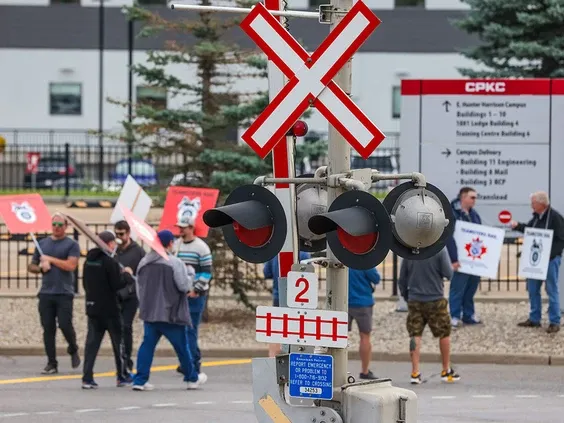Clock is ticking: Railway shutdown expected to cost Canada $341 million a day
With rail services down, businesses are turning to the trucking industry, putting immense pressure on trucking companies to meet demand. “I spoke with a trucking company yesterday, and they said they are absolutely overwhelmed,” Harpe added.

A labor stoppage has brought Canada's two main freight railways, Canadian National Railway Co. and Canadian Pacific Kansas City Ltd., to a halt on Thursday, causing significant disruptions to the economy and trade.
“It’s devastating for our company and manufacturing in general,” said James White, CEO of Wellmaster, a manufacturing and wholesale company in Tillsonburg, Ont., that serves the groundwater, energy, and horticultural sectors.
His company, which exports across North America and globally, is already experiencing financial losses. "We had a purchase order worth over $200,000 that depended on receiving specialty steel, which is currently stuck at the Port of Vancouver. Without the ability to transport it, that order is lost,” White explained.
The broader manufacturing sector in Canada is also bracing for impact. The Canadian Manufacturers & Exporters estimates that the work stoppage will cost manufacturers $275,000 per day.
White expressed frustration over the ripple effects on the economy, especially since the manufacturing sector is already vulnerable due to broader economic challenges.
According to the Railway Association of Canada, the two freight railways transport $1 billion worth of goods daily, owning over 80% of the country’s railway tracks. Moody’s Corp. estimates that the work stoppage is costing the Canadian economy $341 million per day, equivalent to more than 4% of the country's gross domestic product.
Brendan LaCerda, director of economic research at Moody’s, highlighted that the industries most affected by the rail strike include paper and wood products, agriculture, exports, motor vehicles, metals, and quarrying.
Farmers are also feeling the strain. Andre Harpe, a canola and malt barley farmer with a 5,000-acre farm near Grande Prairie, Alta., said the strike’s impact was evident last week when his grain wholesaler stopped accepting deliveries. “We invested heavily in our crops last spring, buying fertilizer and seeds. Now, we’re scrambling to ensure we have enough and proper storage, as our contracts require us to maintain the grain’s quality,” Harpe said. The strike comes at a critical time for farmers as the harvest begins in Western Canada. Grain Growers of Canada estimates losses of $43 million a day in the first week of the stoppage and $50 million a day in the second week.
With rail services down, businesses are turning to the trucking industry, putting immense pressure on trucking companies to meet demand. “I spoke with a trucking company yesterday, and they said they are absolutely overwhelmed,” Harpe added.
Small businesses are also feeling the effects. The Canadian Federation of Independent Business (CFIB) reported concerns among its members about delays in receiving essential imports, such as aviation fuel for firefighting equipment, manufacturing inputs, auto parts, retail goods, and agricultural equipment.
“Not only will the work stoppage disrupt shipments of critical materials and goods for small businesses, but it will also lead to shortages of consumer products, including groceries, drugstore essentials, and even baby formula,” said CFIB CEO Dan Kelly. He added that some small businesses might have to halt operations because they can’t receive vital supplies or fulfill contractual obligations.
Despite urgent calls from the federal government for all parties to reach an agreement, negotiations have yet to yield a deal after months of talks. CN and CPKC issued a lockout notice to the 9,300 employees represented by the Teamsters Canada Rail Conference (TCRC), signaling a labor stoppage if no agreement was reached by midnight on Thursday. TCRC also issued a strike notice to CPKC in the absence of a settlement by Thursday.
Key issues in the negotiations include fatigue provisions for workers and what the union describes as a forced relocation scheme, which would require workers to move across the country for months at a time to address labor shortages, separating them from their families.
"Without an agreement or binding arbitration, CN had no choice but to finalize a safe and orderly shutdown and proceed with a lockout," CN Rail said in a statement. The company claimed it has negotiated in good faith over the past nine months, offering better pay, improved rest, and more predictable schedules, but accused the Teamsters of lacking urgency or a desire to reach a deal beneficial to employees, the company, and the economy.
Business groups have pointed out that the federal government has two options to end the work stoppage. The labor minister could refer the dispute to the Canada Industrial Relations Board for binding arbitration under Section 107 of the Canada Labour Code. However, Labour Minister Steven MacKinnon rejected CN Rail’s request for binding arbitration a week ago.
The second option is for Parliament to pass back-to-work legislation, as it did to end a strike at Canada Post in 2018 and another at the Port of Montreal in 2021.
Beyond the immediate economic impact, Canada’s reputation as a reliable trade partner is also at risk. The United States Chamber of Commerce, alongside the Canadian Chamber of Commerce, issued a statement on Monday urging the Canadian government to prevent the rail stoppage, emphasizing the interdependence of the two countries' supply chains.
“The impact on how Canada is being perceived is devastating,” White said. “People are losing confidence in Canada. What was once a premium 'Made in Canada' label on our parts is now seen as a risk. Canada is no longer regarded as a serious trading partner.”





